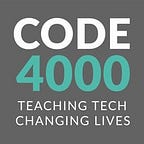This is week five of our social media campaign raising awareness and funds for Code4000. Last week, we discussed how Ammanul ‘crossed the threshold’ when moving to an unknown environment. In this week’s continuation of ‘The Hero’s Journey’, we discuss the resilience and strength exhibited by Code4000 students during the coding programme, spurred onwards by the assistance of Code4000’s hardworking staff and teachers. In an article written by Professor Alison Liebling from the University of Cambridge, titled ‘Are Hope and Possibility Achievable in Prison?’, she elaborates on the element of hope that can exist within prison walls. An interviewed prisoner in her study recalls that, ‘You see guys moving on. There is humanity here … People treat you as a person who has potential’ (2019: 104). This perfectly echoes Ammanul’s experience with Code4000. In our interview with Ammanul, he praises how ‘Code4000 allowed [him] to stay away from the negative stuff… [and] focus on things that I could potentially do walking out of there’.
However, it is important to note that this experience of learning how to code was not without its trials and hardships. After all, Code4000’s students are learning highly complex programming languages (e.g. HTML, Javascript) that take even computing professionals months to properly master. Ammanul recalls how Code4000 students faced the additional hurdle of lacking access to the Internet, which meant they were unable to look up questions online upon encountering difficulties during their coding experiences. ‘It was difficult’, Ammanul recounts, ‘but hey, we had books so I would take the books all the way back to my cell… sit down and try to find out the answers the old-fashioned way’. Such commendable demonstrations of determination and perseverance by Ammanul and fellow Code4000 students show the amount of hope that Code4000 cultivates and nurtures.
Furthermore, it must be noted that what limitations Code4000 students face in terms of material resources, they make up for in the sense of community and solidarity with one another. ‘Everyone was always by each other’s side,’ describes Ammanul. ‘When I needed help, they would come running in and they always gave me the amount of help that I needed… whether it took an hour or even half a day. They were constantly behind me.’ Not only does this benefit the individual learner, it inspires the student to pass on the torch of knowledge. ‘When somebody new came to Code4000, I knew it was up to me to help [him]’ relays Ammanul, ‘It’s just automatic because it was something I used to appreciate when I was stuck.’
In Professor Liebling’s article ‘Are Hope and Possibility Achievable in Prison?’, she identifies the importance of prisoners’ feelings of hope and purposeful activities towards their wellbeing and growth, and Ammanul makes a persuasive case that Code4000 is such an example of transformation. As he aptly observes, ‘It is easy to be negative [during one’s time in prison], but what Code4000 does is that it allows you to focus on the present.’ It enables students to take their minds away from worries about the future or mull over the past, and do what is most important — working hard at one’s individual goals at the present moment.
Ultimately, such stories of commitment demonstrated by both Code4000’s students and staff are highly inspiring. Code4000 relies on small donations from individuals to keep offering their commendable teaching and support to their students, so please consider offering your support to the organisation and their meaningful ethos through the donation button on the homepage of Code4000!
You can help support the work of Code4000 by making a donation here.
